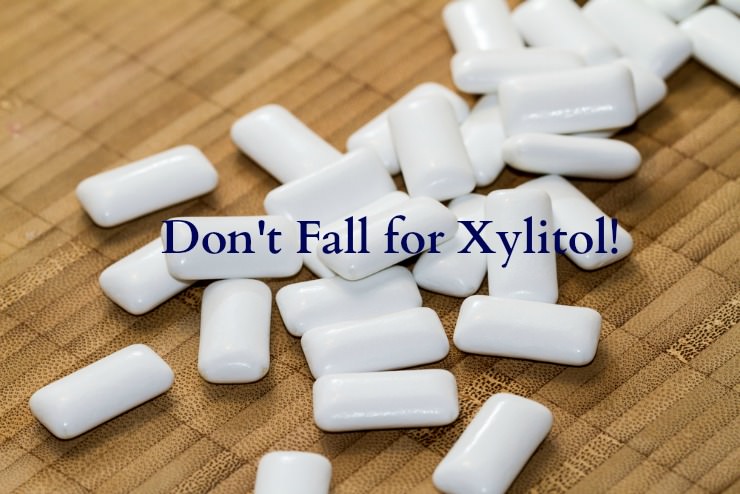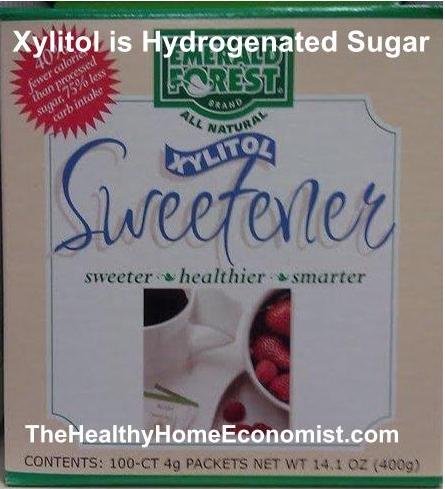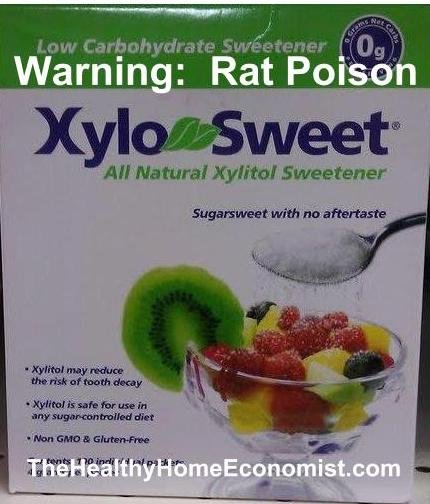
Xylitol is truly the darling of sugar substitutes today. The American Dietetic Association touts its use, with this sugar alcohol sold alone and as a sweetener in a variety of processed foods. Health benefits include a reduced glycemic response compared with sucrose, increased absorption of B vitamins and calcium, and even a reduction in dental caries risk.
Consequently, people with blood sugar issues are flocking to processed foods containing this alternative sweetener as a way to satisfy that sweet tooth without the downside of exacerbating the risk factors for Metabolic Syndrome. This condition is known for the markedly increased likelihood of developing heart disease, stroke, and type 2 diabetes.
Even the healthfood community almost universally considers this sugar alcohol to be a healthy substitute for sugar. A primary reason is that it doesn’t directly contribute toward the growth of intestinal yeasts aka Candida.
Have you noticed that the check out aisles at health food stores are typically loaded with chocolates and other sweets containing at least some xylitol? The truth is that I have yet to talk with any health-conscious person who suggests to me any downside other than the potential for intestinal cramps if you get too much.
Xylitol is Naturally Found in Nature
Xylitol is, after all, a naturally occurring substance. Manufacturers of xylitol market it as derived from xylan. The fibers of many plants contain it, including berries, oats, beets, sugar cane and birch. Sounds pretty harmless at first glance.
The FDA has even granted xylitol GRAS (Generally Recognized As Safe) status. You can’t get any safer than that, right?
 Manufacturing Process
Manufacturing Process
It is true that xylitol is a naturally occurring substance. However, manufactured xylitol is another matter entirely. Food manufacturers produce it using the industrialized process of sugar hydrogenation. In order to hydrogenate anything, a catalyst is needed. In this case, Raney nickel is used which is a powdered nickel-aluminum alloy. (1, 2)
This poses the risk of heavy metal residue and contamination. Nickel, by the way, is a recognized carcinogen and aluminum is associated with the development of dementia. Heavy metals in the body are notoriously difficult to eliminate with frequent use of infrared sauna probably a good idea.
This alternative sweetener doesn’t seem quite so warm and fuzzy anymore, does it?
There is currently no literature on any detrimental health effects of consuming hydrogenated sugar. However, food manufacturers widely used hydrogenated fats for decades before the very damaging effects of cardiovascular health became widely known!
Given the violent industrialized process that is required to produce a hydrogenated sugar like xylitol, it would seem wise to avoid it based on the very poor track record of hydrogenated foods in general.
Most Xylitol Sourced from GMO Corn
While it is true that xylitol can be derived from the xylan of birch trees, xylan is also found in corn cobs. It is much cheaper to use corn instead of birch bark to derive xylitol and so what do you think manufacturers prefer? Corn, of course.
Therefore, unless the label of a xylitol-containing product specifically notes that it is from birch or another nonGMO source, xylitol is very likely from genetically modified corn or possibly GMO sugar beets.
This is the same problem as high fructose corn syrup (HFCS) and white sugar from beets. Food manufacturers rely heavily on these sweeteners in the production of sodas and sports drinks.
You get a dose of GMOs with every sip! More on GMO dangers including sterility and stomach holes at the provided link.
Usage Contributes to Gut Imbalance
The digestive process does not break down sugar alcohols like food. Rather, xylitol arrives intact into the intestines.
At that point, a process called “passive diffusion” takes place. This means that the xylitol draws water into the bowels. Only a partial breakdown is the end result. The unmetabolized portion ferments providing the perfect environment for undesirable bacteria to thrive and grow.
It is true that xylitol itself does not feed candida directly as sugar does. As a result, this artificial sweetener is even promoted as a useful part of the Candida Diet. Unfortunately, the fermentation of undigested xylitol in the gut most definitely can exacerbate yeast problems. Don’t be fooled by this argument!
This is exactly why consuming xylitol can make some folks so gassy and even trigger cramping and diarrhea. Gut pathogens having a heyday in your intestines give off a lot of smelly toxins!
Other Little Known Problems
Xylitol can contribute to acid reflux problems. As a result, those who have issues in this area should avoid it for that reason alone. Chronic acid reflux is a serious problem that can lead to cancer of the esophagus and larynx.
In addition, those who suffer from seizures of any kind should stay away from this alternative sweetener as it can increase the frequency of epileptic attacks.
Two Pieces of Xylitol Gum Can Kill a Rat?
According to unpublished lab tests, approximately 1.65 grams of xylitol kills a 100-gram rat half the time.
Two little pieces of xylitol gum contain about .7 – 1 gram. This is probably enough to meet the definition of rat poison.

Cavity Prevention
Many people are chewing xylitol gum due to compelling scientific evidence for cavity prevention. What about children, however?
Rami Nagel, author of Cure Tooth Decay, doesn’t even recommend xylitol gum for this purpose. His research for any long term safety data turned up the following:
- Epidemiology: No information found
- Teratogenicity: No information found
- Reproductive Effects: No information found
- Mutagenicity: No information found
- Neurotoxicity: No information found
In summary, using this modern substance officially renders you a guinea pig, my friend! It seems that any benefits of cavity prevention are outweighed by the fact that there is no actual safety data backing up its use.
Safe Uses of Xylitol
Given all the problems that consumption of xylitol can trigger, it seems best to bypass the use of this sugar substitute on a regular basis.
Can it ever be helpful? Does it have any benefits whatsoever?
Potentially so. The only time I personally would ever consider using xylitol is to help resolve a childhood ear or sinus infection in order to prevent the use of drug-based antibiotics.
There is evidence that this popular sugar alcohol can indeed help encourage a healthy balance of beneficial bacteria found in the ear canal and sinus cavities. Products like this incorporate xylitol for this purpose.
A therapeutic dose can help resolve infection in these areas quickly with no medication required.
Thus, if you choose to use it, make sure it is sparingly and therapeutically (not as food). Also, make sure it does not come from a GMO source like corn!
References
(1) Xylitol production via catalytic hydrogenation of sugarcane
(2) Catalytic hydrogenation of xylose to xylitol using ruthenium catalyst on NiO modified TiO2 support
(3) Cure Tooth Decay by Rami Nagel
(4) Sugar-Free Blues: Everything You Wanted to Know about Artificial Sweeteners
More Information
Yacon: Healthy Syrup or Healthfood Hype?
Jaggery: India’s Sweet Gift








I am new to this website; I enjoyed reading this page. In 1973 I got my Biology degree and Chemistry minor. I felt good about my understanding of life, food, vitamins, minerals, enzymes, health, etc. Early I was exposed to Prevention magazine and some health-conscious people. I read that tooth paste was too abrasive, orange juice was too acidic, sugar was poison, and MSG was harmful. I thought, why don’t they tell me what I can eat or use, not what I can’t! It turns out that you can read something negative about practically everything we could eat. Furthermore, like many people, I’ve had to sort out the whole natural vs synthetic thing and the whole organic vs other stuff thing.
So now I’ve just been exposed over the weekend to Xylitol in coffee given to me by a good friend, and it tasted great to me. Though most of the literature doesn’t find anything wrong with it, I’ve run into this blog today. I’ve seen a general bias against Xylitol here, but also some very good facts and hard science; and I think a generally good discussion. Hopefully I can add a little. My conclusion for now is that some people can’t drink milk, some can’t have wheat, some can’t have too much phenylalanine, some people can’t eat sugar, etc… But I can and do eat and drink all those things and orange juice too. So for me, if some people have digestive or other immediate problems with using Xylitol, that doesn’t disqualify its use for me; but it gives me pause before suggesting it to others without qualification. GMO is high on my suspect list right now because the literature is filling with negative issues, so that’s the other thing on my radar now to watch for. Thanks for bringing that up Sarah (By the way, nothing I learned in 1973 worried me about GMO).
Regarding processing of foods and supplements, really, every vitamin bottle on the shelf is a highly processed and unnatural form of the vitamin. Where can you eat a gram of anything “natural” and get 1000 milligrams of vitamin C into your system? One other comment about what was said back on 12/06/12, “I never trust anything that is pure white”. I suppose many of your readers know that so very many natural components of our foods including all the amino acids are pure white crystalline substances. In our quest to beat down over-use of that empty-calorie, pure, over-processed sucrose table sugar… let’s not vilify everything that simply looks like white processed sugar. 🙂
This article is misleading. I have used xylitol (from birch trees) on a daily basis for years with zero negative effects. I purchase it from Globalsweet.com. Their product is made entirely from organic birch trees. The xylitol made from corn (most brands in America are made from corn) is the one to avoid. Do your research and buy the good stuff. Xylitol is an excellent, natural sweetener when processed from BIRCH TREES. Globalsweet.com has an excellent reputation and fair prices. Visit their web site which has a comparison of all popular brands of xylitol. ONLY Global Sweet is made from organic hardwood, has no GMO’s, and is made in the USA! http://www.xylitol-brand-comparison.com
According to the Material Safety Data Sheet for xylitol, the LD50 (dose that will kill 50% of rats/mice) is 22,000 mg/kg. By comparison, the LD50 for table sugar (sucrose) is 29,700 mg/kg and the LD50 for table salt (sodium chloride) is just 3,000 mg/kg. My point is that a lot of things that we commonly consume have the potential to be lethal in excessive quantities. That doesn’t mean that they aren’t safe to consume in moderation. According to the Dept. of Health & Human Services, the average American consumes 152 lb of sugar each year. At a rate of 15 g/0.5 oz per day of xylitol, your annual consumption would be just 12 lb per year.
I agree with some of the commenters here- it is silly to say something kills rats therefore it’s bad for humans. We metabolize lots of things differently than animals. If a dog eats a whole steak he runs the very real risk of pancreatitis, which is deadly. It’s absurd to compare anything to a rat. Xylitol has been consumed for over a hundred years, it’s not like it’s some new-fangled sweetener that hasn’t been researched in depth for safety. Where are the sources for this anyhow? We need to be cautious about what we eat, but we also need to not believe everything we read on the internet, especially when it’s written without sourcing the doom and gloom. Sheesh.
Thank you, Jordan, I was thinking the same thing. Folks, just because something is derived from another substance in a lab, does not automatically mean it is “unnatural” and thus dangerous (for example: baking soda). I would use some caution when trying to find any sugar substitute as the whole point is to change our tastes, no? Cut out the daily sugar and save it for special occasions. However, I don’t think a little xylitol here and there is harmful. It is found naturally in fruits and vegetables and is produced by our bodies during metabolism. I don’t think we need to freak out about it in our toothpastes. There is a tendency to jump on a bandwagon and use excessive amounts of something as the new cure all (butter oil anyone?) and I think all things need to be judged with caution. That being said, there is also a tendency amongst us naturally minded people to mistrust anything that remotely sounds like a chemical. I wouldn’t order it in bulk, but I wouldn’t throw out everything with a drop of it either.
Does anybody know of a xylitol-free gym. I’ve searched and have yet to find anything.
WOW!!! I had an intuitive feeling that this stuff was not good. A lot of people on my page have asked about this so this is a very timely article. Thank you Sarah!